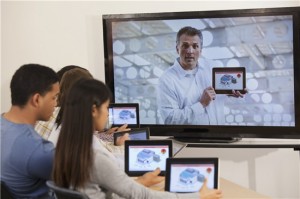 As an educator, I’ve always been a bit wary of online educational programs. Can anything truly replace the interactive learning experience that students get in a traditional classroom, sharing ideas with each other and with their teacher?
As an educator, I’ve always been a bit wary of online educational programs. Can anything truly replace the interactive learning experience that students get in a traditional classroom, sharing ideas with each other and with their teacher?
Then my son announced that he had enrolled in an online degree program to get his Masters of Library Science degree. I knew that he needed the degree to further his career as a librarian, but I was disappointed that he had decided to enroll in an online program instead of a “real” classroom.
Well, my son proved me wrong. As I watched him go through the accelerated MLS program and earn his degree, I learned that every prejudice I had about online degree programs was unfounded. Here’s what I learned:
Online programs are held to the same academic standards as traditional degree programs
When online programs first launched nearly two decades ago, they were derided for being “buy your degree” programs. Well, times have changed. For professional degree programs, online courses are no longer seen as second-best; they are often the most efficient and effective way to accelerate your education and receive a degree. Online RN to BSN programs, for example, are every bit as rigorous as brick-and-mortar programs, and the nurses they graduate are every bit as capable. Likewise, my son’s MLS program included the same academic high standards as any college course I’ve ever taught.
Students who are apprehensive regarding online degrees should consider the fact that countless schools have started adopting this fairly new method of teaching with excellent results. Once students discover that online programs are held to essentially the same standards as any other institution, they will begin to see the advantages. Students can work hard to achieve countless excellent degrees such as a Master of Arts in Communication, a Master of Business Administration, or even their M.S. in Engineering Management. All the student needs to do is make the first move and sign up.
Online programs encourage in-class participation
I was worried that my son wouldn’t get to take part in the natural banter that occurs in a traditional classroom, the type of back-and-forth conversation that results in so many “eureka” moments for young learners. Then I watched him contribute to his online program’s forums and chat programs. He wasn’t participating less during his online courses — in fact, just the opposite. Because of the unique nature of the online classroom, my son was actually able to participate more.
During a traditional class session, students are only able to contribute during small portions of the learning period — perhaps 15 minutes every hour depending on the course. During an online course, students carry on continuous conversations via computer which later spill into Facebook chats and Skype sessions. When I saw how much my son was learning from his peers, and how much he was sharing with them in return, I was amused that I ever thought that online programs would inhibit conversation.
Online programs include in-person lab components
“How can you become a librarian without doing hands-on work in a library?” I asked my son. Then he told me about his “lab courses,” which did in fact take place in a university campus library. Similarly, my friend who is getting her BSN had lab courses that took place in hospitals. Online courses do not eliminate the necessary in-person work; the courses simply allow students to complete several coursework components online.
Online programs help students get jobs
I’m a bit embarrassed to say that one of the reasons I was nervous about my son starting an online program was that I was afraid it would not help him get a job. Once again, my fears were unfounded. Online degrees do in fact lead to employment, and having an online degree on the resume does not devalue a candidate. As always, the type of degree you choose helps determine your job opportunities. The US News and World Report recently released a list of top online degrees that lead to good jobs; my BSN friend will be very pleased, as nursing is high on the list.
Online learning is here to stay, and I’m grateful it has done so much to help students further their education. Watching my son earn his degree, I learned a lot about how online courses work, and was pleased to learn that they did an excellent job of preparing him for his current job as a librarian.
___________________
About The Author: This is a guest post by Kyle Johnson. Kyle has been blogging online since her kids were under 10 years old! Kyle likes writing about parenting, family experiences, and education. She has used her hands on experience to provide insight to the life of a parent and a teacher!






